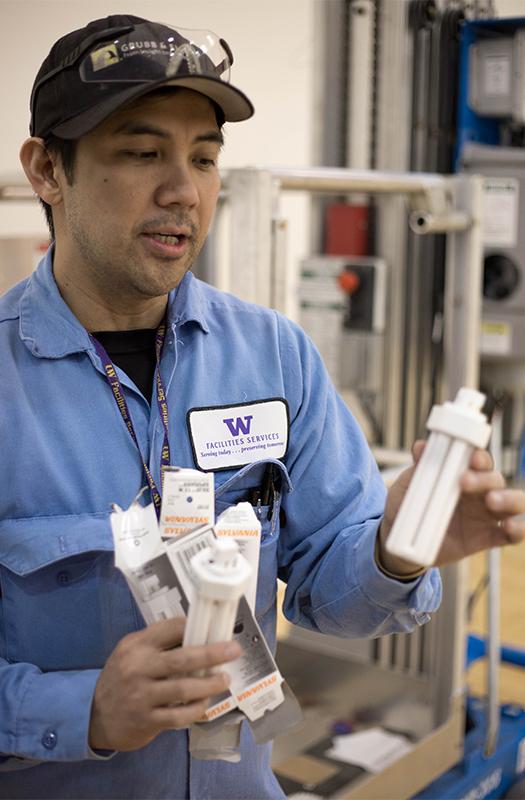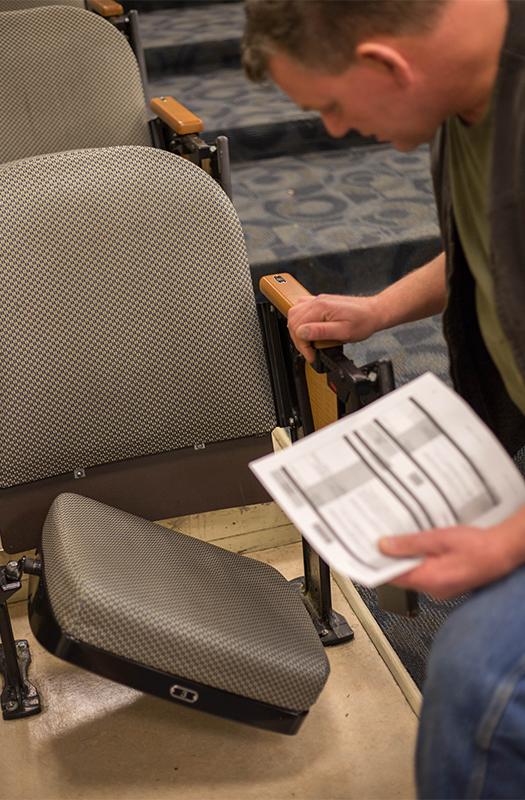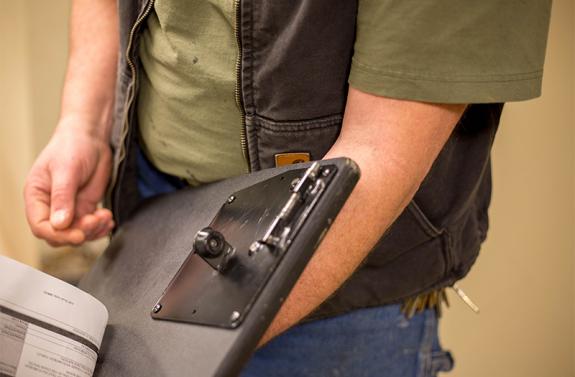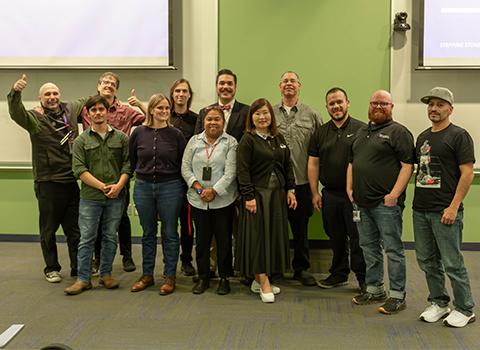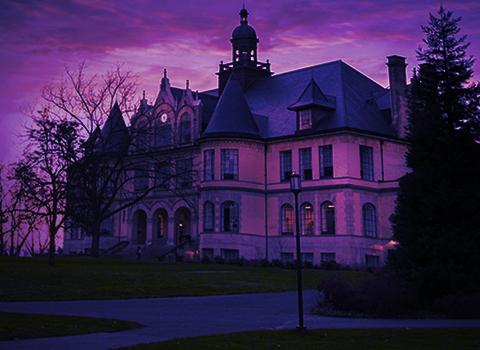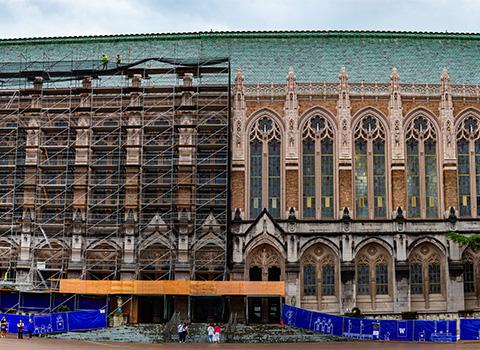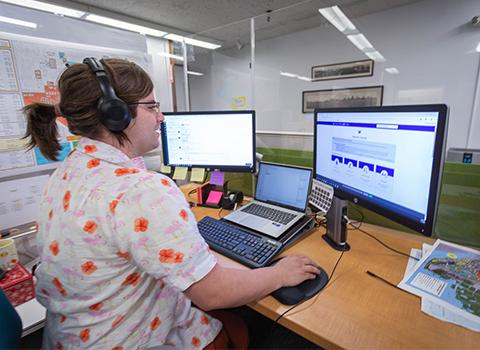Shop 41 Night Owls

Back row: Jim Rossi, Dan Hansen, Todd Rollins, Andre Menezes, Kao Saetern. Not pictured: Madison Son. Front row: Challase Hitch, Ramil Hernandez, Virgilio Hernandez, Joan Rice, Dario Rillo, Hector Rillo, Danilo Lambino, Eric Yerxa.
Support and care. That’s the feeling you get when you talk with any member of Shop 41, Facilities Maintenance & Construction’s night maintenance team.
“I really feel like I have campus’ back sometimes,” said Shop 41 technician Jim Rossi. “We see where lights are out that might create some extra darkness, a safety concern. If we find an unlocked door late at night, we work with UWPD and lock it up. We’re all together here; we’re one University and we want to help keep it safe and running smoothly.”
Shop 41 is responsible for night-time maintenance, which typically falls under electrical lighting work, building filter maintenance and corrective work orders.
They’re a dedicated team, working from 4 p.m. to 2:30 a.m. Mondays through Thursdays (or early Fridays, depending on how you look at it.)
“We replace a lot of light bulbs, ballast, lamps and fixtures,” said interim Shop 41 Supervisor Eric Yerxa. “This also includes a lot of life-safety lighting, such as emergency and exit signs, blue emergency phones and other lighting systems.”
But while they may be known as the nighttime bulb-replacement team, they’re also responsible for maintenance across hundreds, if not thousands of campus classrooms and spaces.
“Shop 41 also has a preventative maintenance side. Every month we check each building’s intake filter. Sometimes we have to change pre-filters, rotate filter media, or sometimes even replace entire filter rolls.” said Sheet Metal Mechanic Lead Dan Hansen. “We also handle classroom support work orders, such as desks and chairs across all of campus.”
Building filters are larger than garage doors, composed of fiberglass and coated in dirt and other particulates. Employees with Shop 41 make their way down to mechanical rooms in dark basements, bringing plenty of gear while outfitted in Tyvek protective gear.
Tasks are detailed and time-consuming for this team. Checking classrooms means going around and testing every seat of every chair, flipping each desk and tightening every screw. Missing one seat could mean a student falling to the ground, or a research project ruined.
Like many shops, positions in Shop 41 were eliminated in recent years as the result of budget cuts, and other positions remain open because of the qualifications required to be a Lighting and Filter Maintenance Technician.
“The amount of projects we receive can sometimes be overwhelming. Everything is urgent, but we can only do so much,” Hansen said. “We do what we can, and our shop’s employees really step up to the plate.”

Jim Rossi uses a lift to reach basketball court lights in the IMA, while Ramil Hernandez readies materials on the ground.
WHY NIGHTS?
WHY NIGHTS?
“I’m kind of a night owl, so this shift really appeals to me,” said Rossi. “It’s really satisfying on night shift because you can finish work, and you’re not in anyone’s way.”
But for others, night shift can actually provide a unique work-life balance.
“Working at night and having a family is the best. I work four 10-hour shifts. I sleep in most days, but I get to pick up my kids from school and have an hour or two of time to spend with them either doing homework or goofing around before I go to work,” said Virgilio Hernandez. “I still get to see my kids, and that’s really important to me.”
But beyond the preferences, night shift has other benefits.
“We can finish a lot of work during our shifts because nobody is in our way,” said Ramil Hernandez, another night shift technician. “During the day it can take two or three times longer to get to a job site, just because of campus traffic.”
“It’s kind of nice that nobody knows who we are or ever sees us,” said Danilo Lambino. “Our work speaks for itself when campus just works.”
“I like the night shift because I’m more removed from the hustle-and-bustle during the days,” said Hansen. “I get to side-step all of the rush-hour traffic. I like to be invisible; I get so much work done because I’m working unencumbered by all of the constraints day shift has.”
Currently working on building filter maintenance, Virgilio Hernandez describes the constraints his team would face on day shift:
“I can go into a building in a full hazmat suit, ready to rotate a building’s filter, a very dirty job, without freaking out students, faculty or staff. Let’s face it, if you worked in a building and saw someone walking around in a hazmat suit you would wonder what’s going on! You might be concerned, but it’s just a regular part of building maintenance,” he said. “I can also go into buildings with a lot of equipment and not worry about displacing a bunch of students or employees, or having to set up as many detours around my work because, well, nobody’s there.”
A CLOSE-KNIT TEAM
A CLOSE-KNIT TEAM
Shop 41 doesn’t just provide support and care for the University of Washington—they make it clear that their team is all about supporting each other.
“We’re a close-knit group, and we have to be. A lot of the work we do is based on group knowledge; you’re not going to learn it without people to show you,” said Rossi. “Campus has some incredibly unique and complex buildings and systems. To get to the point where you know campus like the back of your hand, well, that takes a transfer of knowledge you get from your coworkers showing you everything they know. It requires a lot of trust and intimacy.”
Shop 41 operates on a rotating partner system. Every few months the employees switch up their partners and start new tasks, fostering better relationships and keeping the work interesting.
“We’re working at night in dark basements and mechanical rooms. To thrive in that kind of environment, you really need to trust your team and work partner,” said Virgilio Hernandez. “We know the names of our coworkers’ children; we really know and support each other.”
More than half the employees of Shop 41 describe their team as, “like a family.”
“It’s not like we’re a perfect team, we have issues like any family might,” said Lambino. “But we really do help each other out. After all, it’s just us working on night maintenance. If it’s a tough project we’ll do whatever we can to fix it. That’s just how we are, our shop is like that.”
